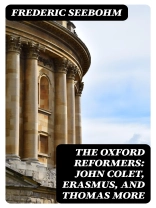In ‘The Oxford Reformers: John Colet, Erasmus, and Thomas More, ‘ Frederic Seebohm provides an incisive exploration of the intellectual milieu surrounding three pivotal figures of the Renaissance. The book examines the interplay of humanism and religious reform during the early 16th century, articulating the contributions of Colet, Erasmus, and More to the renewed emphasis on classical knowledge and critical thinking within the context of an increasingly turbulent ecclesiastical landscape. Seebohm’s narrative combines thorough historical analysis with compelling prose, situating these reformers not merely as isolated thinkers, but as part of a broader movement that sought to reconcile faith and reason through discussion and education. Frederic Seebohm, a historian with a keen interest in the Reformation, harnesses his expertise to delve deeply into the lives and works of these influential figures. His background in historical literature and his understanding of the cultural currents of the time enable him to draw connections between their philosophical ideals and the social changes occurring in European society. By revealing the nuanced relationships among Colet, Erasmus, and More, Seebohm provides critical insights into their collaborative efforts to reshape religious thought. This book is recommended for anyone interested in the foundations of modern Western thought, as well as those seeking to comprehend the intricate dynamics of early modern reformers. Through Seebohm’s articulate synthesis of history and biography, readers will gain a deeper appreciation for how these scholars navigated the challenges of their time, making significant strides toward the enlightenment and secularism that characterize contemporary society.
Sobre o autor
Frederic Seebohm (1833–1912) was a distinguished British historian recognized for his extensive research on the social and economic history of England. Born in Bradford, Yorkshire, he was not only a man of letters but also a banker by profession, which infused his historical work with a keen insight into the economic underpinnings of societal development. Seebohm’s scholarly approach drew from a breadth of sources, setting him apart as a meticulous researcher in an era when historical rigor was burgeoning into the academic discipline we recognize today.
His magnum opus, ‘The Oxford Reformers: John Colet, Erasmus, and Thomas More’, first published in 1867, is a seminal work that recounts the lives and intellectual pursuits of these three pivotal figures of the European Renaissance and Reformation. Seebohm’s narrative skillfully interlaces the biographical details with in-depth analysis of their theological and humanist contributions, situating their work within the broader context of European intellectual history. The book remains a key resource for historians and students of Reformation and Renaissance studies, illustrating Seebohm’s ability to synthesize vast amounts of historical detail into a compelling, lucid narrative.
His literary style is marked by precise documentation and a clarity of exposition, characteristics that have bolstered the endurance of his works in the academic discourse. Through Seebohm’s contributions to historical literature, he established himself as a critical figure in the study of the social and religious transformations of his time.












